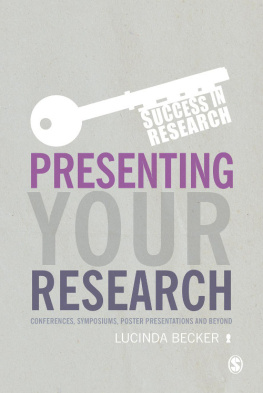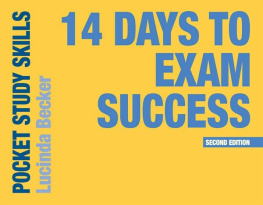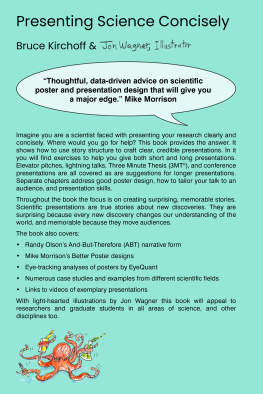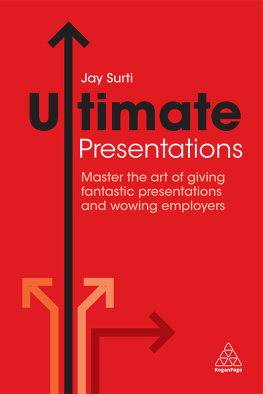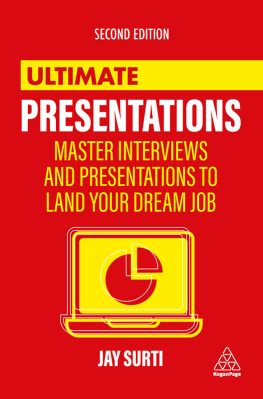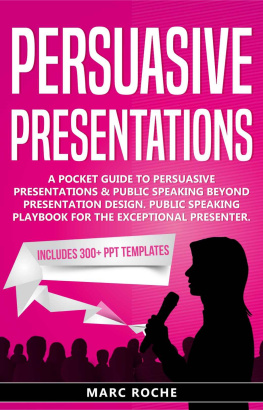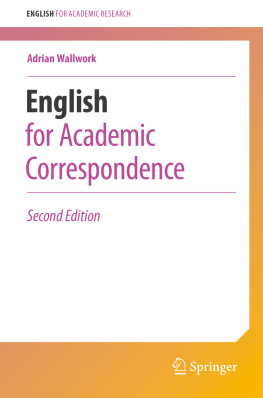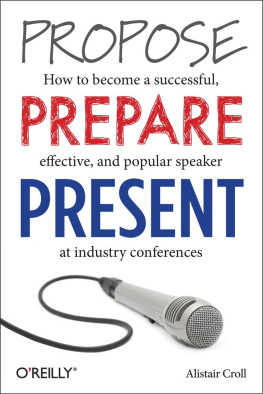

SUCCESS IN RESEARCH
The Success in Research series has been designed by Cindy Becker and Pam Denicolo to provide short, authoritative and accessible guides for students, researchers and academics on the key area of professional and research development.
Each book is written with an eye to avoiding jargon and each aims to cut to the chase of what readers really need to know about a given topic. These are practical and supportive books and will be essential reading for any students or researchers interested in developing their skills and broadening their professional and methodological knowledge.

Lucinda Becker 2014
First published 2014
Apart from any fair dealing for the purposes of research or private study, or criticism or review, as permitted under the Copyright, Designs and Patents Act, 1988, this publication may be reproduced, stored or transmitted in any form, or by any means, only with the prior permission in writing of the publishers, or in the case of reprographic reproduction, in accordance with the terms of licences issued by the Copyright Licensing Agency. Enquiries concerning reproduction outside those terms should be sent to the publishers.
Library of Congress Control Number: 2013946899
British Library Cataloguing in Publication data
A catalogue record for this book is available from the British Library
ISBN 978-1-4462-7588-7
ISBN 978-1-4462-7589-4 (pbk)

SAGE Publications Ltd
1 Olivers Yard
55 City Road
London EC1Y 1SP
SAGE Publications Inc.
2455 Teller Road
Thousand Oaks, California 91320
SAGE Publications India Pvt Ltd
B 1/I 1 Mohan Cooperative Industrial Area
Mathura Road
New Delhi 110 044
SAGE Publications Asia-Pacific Pte Ltd
3 Church Street
#10-04 Samsung Hub
Singapore 049483
Editor: Katie Metzler
Editorial assistant: Lily Mehrbod
Production editor: Thea Watson
Copy-editor: Neil Dowden
Proofreader: Bryan Campbell
Marketing manager: Ben Griffin-Sherwood
Cover design: Shaun Mercier
Typeset by: C&M Digitals (P) Ltd, Chennai, India
Printed in Great Britain by Henry Ling Limited at
The Dorset Press, Dorchester, DT1 1HD

ABOUT THE AUTHOR
Dr Lucinda Becker, an award-winning Associate Professor in the Department of English Literature at the University of Reading, University Teaching Fellow and Senior Fellow of the Higher Education Academy, has spent her career committed to enhancing the skills and knowledge of undergraduates and research postgraduates. She has written numerous successful study skills guides for students. As a professional trainer she also works throughout the United Kingdom and Europe, devising and delivering training in communication and management techniques, principally to lawyers, engineers and scientists.
One
INTRODUCTION
Working as part of a community is the lifeblood of academia and, indeed, of most commercial organisations. Although there will be times, perhaps most of your time, spent working alone on a project, if you cannot stand up and present your findings, in one form or another, you will struggle to achieve the intellectual and professional success which will allow you to move on to even more interesting projects. Being seen to present successfully is part of being successful in professional and academic settings alike; this is something you need to get right. This sounds a little dramatic, so for a moment I will consider with you what might be gained from presenting:
You can test out your theories on like-minded people, to see what they think.
Just as importantly, you are testing out your hypotheses and your material on yourself. By speaking out loud you will find that your thoughts crystallise: if something does not sound quite right, it will become clear to you as you prepare to speak.
You will receive encouragement from your peers. I am always pleased to be reminded of how generous audiences are: they really do want you to do well.
You will be gaining valuable feedback on the specifics of your work. This is the most obvious benefit to be taken from presenting your research and it should never be underestimated (even if, at times, it can be a little challenging).
Unlike a publication, the feedback you receive is in real time: as you present your findings, so you get an immediate response. Reviews of a publication are quite a different thing: at that stage there is nothing you can do to change your published words.
Presenting allows you to take a break from your day-to-day activity as a researcher. This may sound minor, but it can be hugely important in practice. In taking a break from your everyday research life, you are allowing some intellectual fresh air into your mind: great thoughts often appear on the train to or from an event.
You will be showered with ideas, references and resource information as you present. This can be a little bewildering the first time you do it, but every lead someone gives you will represent hours of detective work which you now no longer have to do. You need to see yourself as a research honey-bee, gathering as much helpful information as you can before you return to the hive to ponder on it.
You will learn about the money. Which grants are being offered, which of your fellow scholars are grouping together to bid for funding in an area where you could also collaborate, which funding body is thought to be turning towards an area in which you work, which universities are hiring lecturers, and so on. This information may well not be available in print at the time of the event, so you are ahead of the game simply by being there.
You will be raising your professional profile by presenting. For most scholars, most of the time, funding (either in the form of a research grant or a job as an academic) is going to be key to their continued research, and the esteem in which it is held, so recognising this aspect of presenting is crucial.
There is one final benefit to be had, which is pure pleasure: feeling that you are part of a community, and that is where I will begin
Becoming part of the general community of scholars or professionals and, more especially, becoming part of your own particular niche group, does not happen overnight, nor is it achieved without effort. However, the effort is undoubtedly worth it. I recall the first conference at which I gave a paper. I was terrified far more terrified than I had expected and was hardly sure about how I was going to get through the half hour that my paper would take. I did get through it, but rather badly, I thought. I blushed terribly throughout, read the paper with relatively little expression, answered the questions which the audience members posed and frantically made notes as they offered help. It took perhaps six months for me to realise fully how wonderful the occasion had been. I was still, even after so many months, looking up and using the material which had been mentioned by the audience; I had dropped a whole planned chapter of my Masters dissertation because, in the light of the comments made, I could now see that it would not fit with my central hypothesis; I had gone back and corrected a false assumption I had made, which a fellow scholar (who later became a good friend and mentor) had gently pointed out as erroneous.
Next page
